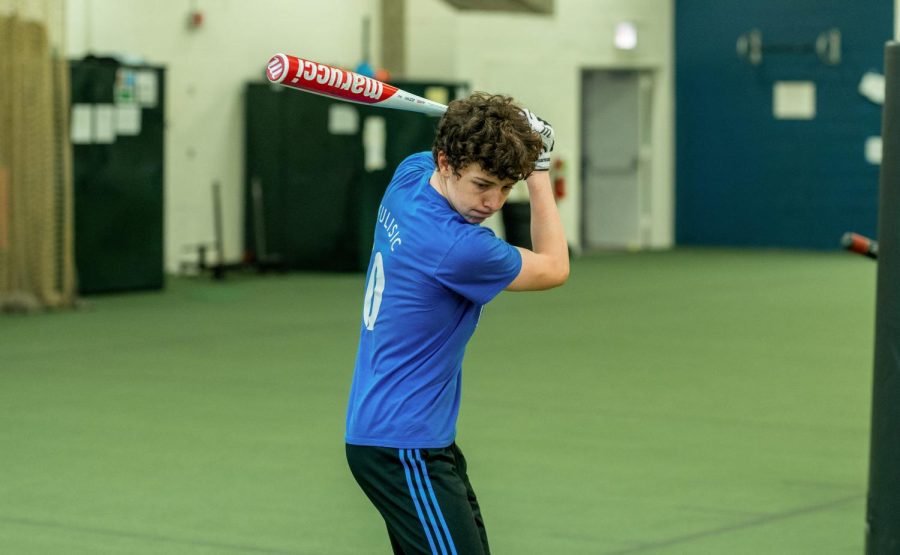UChicago economics study tests baseball team
EXPERIMENTAL SEASON. Sasha Duda prepares to swing during practice with his team at the Henry Crown Field House. Sasha and his teammates are participating in a University of Chicago economics study.
February 21, 2023
In preparation for the upcoming baseball season, players have spent the offseason undergoing a special kind of training, one specifically designed by former MLB affiliates including major league coaches. But instead of being organized by the athletics department, the training was run through the Kenneth C. Griffin Department of Economics at the University of Chicago. The training was the basis of a 12-week study focusing on the effect of various training habits on player performance.
Professor John List, the parent of junior Mason List and several U-High baseball team alumni, aimed to explore the production function of baseball, a method of experimenting to relate certain inputs with a specific output. Faith Fatchen, a UChicago pre-doctoral student who assisted in the study, said Dr. List was interested in examining what science could say about baseball.
“In the context of a baseball player, you can think of ‘What are you training for to then get an output you want?” Ms. Fatchen said. “It’s a measure of success.”
The study contained three experiment groups: one undergoing special training using over-weighted and under-weighted bats and balls, one training with standard weights and one control group that did not participate in specialized training.
Ms. Fatchen said these groups were chosen to get a more precise estimation of the results, given that the respective inputs would move differently.
“The goal is to get an unbiased estimation of the production function,” she said. “What we’re doing is introducing experimental variation in those inputs.”
The two test groups trained with researchers three days a week, practicing with their designated equipment under specified training protocol created by a team of former MLB affiliates and coaches. The control group held normal practices. All players attended specific test points three times during the study: Oct. 31, Dec. 11 and this month. The test points gathered information on exit velocity — how fast the ball moved once it was hit — and throwing velocity — how hard the ball was thrown.
Junior Sasha Duda, who was in the regular-weight testing group, said that in general the study has had a positive effect on players.
“It’s pretty good on the mental side of things. It creates a good team cohesion,” he said. “Generally we’ve been getting quite a lot out of it just for ourselves and each different aspect.”
He also thought that the training helped the team in their regular practicing. He said it allowed the team to get back into the rhythm of the season, allowing players to get meaningful throwing and hitting practice together as a group.
“It’s a little bit more laid back. When we’re in the season, there’s kind of set goals that you have for practice,” he said, regarding the regular baseball season. “It’s not super forced, it’s more laid back and not as strict. It’s easier for us to communicate.”
Ms. Fatchen, who has worked with Dr. List previously but is not entirely familiar with baseball, said she loves learning new things, and she’s learned a lot assisting with this study.
“It’s been interesting not just learning the economics literature but also the strength and conditioning literature,” she said.
Baseball coach Luke Zavala said he couldn’t be happier that the team had the opportunity to participate.
“They’re getting the chance to follow an incredibly well-supervised, high-level training program with elite-level coaches, those that train major leaguers,” he said.
Mr. Zavala also said that beyond getting specialized training, the players benefitted from simply being in a space with one another.
“If you like your teammates, if you enjoy hanging out and being around people, you’re gonna want to train harder for them, cheer them on and hope to see them succeed,” he said. “Those kinds of friendships that develop from the opportunity to workout together are huge.”
As the team gets ready for the regular season, the players are better prepared having practiced under specialized and focused training from professionals — both in baseball and economics.





























































